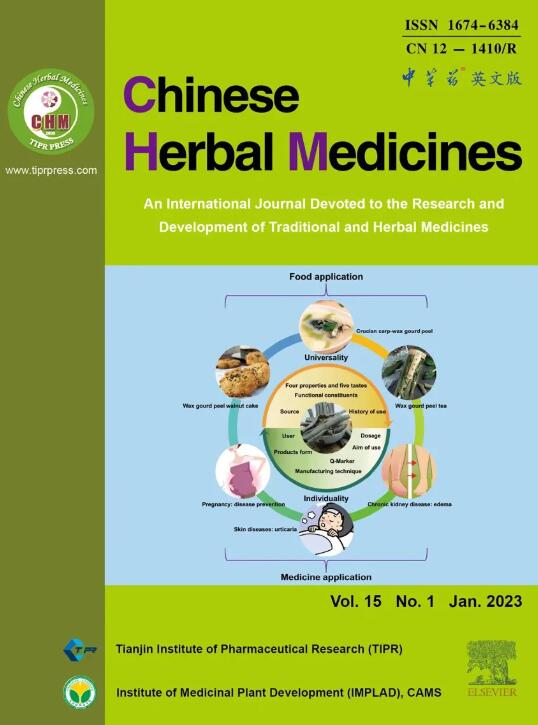Deciphering relationship between depression and microbial molecules based on multi-omics: A case study of Chaigui Granules
IF 8.9
4区 医学
Q1 CHEMISTRY, MEDICINAL
引用次数: 0
Abstract
Objective
To decipher the antidepression effect of Chaigui Granules (CGKL) from the relationship between depression and microbial molecules based on multi-omics.
Methods
Male SD rats were subjected to chronic unpredictable mild stress (CUMS) for seven weeks. The antidepressants CGKL extract and CGKL were administered for the following four weeks. The behavior test and the content of monoamine neurotransmitters were used to evaluate the efficacy of CGKL. The 16S rRNA sequencing, LC-MS technology and molecular biological techniques were used to explore the pharmacological mechanism of CGKL.
Results
CGKL treatment obviously alleviated the depressive behavioral indicators and regulated the content of monoamine neurotransmitters, and presented dose-dependent manner. CGKL could also improve the arginine metabolism disorder of gut microbiota in the jejunum. Meanwhile, the contents of arginine and its metabolites in the serum and hippocampus were regulated to normal levels. Further investigation indicated that the expression of related rate-limiting enzyme genes and proteins in the hippocampus was validated by qRT-PCR and Western blotting. The results showed that the gut microbiota, metabolites, and genes or proteins of rate-limiting enzymes involved in the arginine pathway were significantly regulated by CGKL.
Conclusion
The present study demonstrates that CGKL might exert antidepressant effects through regulating arginine metabolism, and its mechanism may be related to modulating the gut microbiota and related metabolic enzyme.
基于多组学破译抑郁症与微生物分子之间的关系:柴桂颗粒的案例研究
方法对雄性SD大鼠进行为期7周的慢性不可预知的轻度应激(CUMS)。对雄性 SD 大鼠进行为期七周的慢性不可预知轻度应激反应(CUMS),并在随后的四周内服用抗抑郁药物 CGKL 提取物和 CGKL。通过行为测试和单胺神经递质含量来评估 CGKL 的疗效。结果 CGKL能明显缓解抑郁行为指标,调节单胺神经递质含量,并呈剂量依赖性。CGKL还能改善空肠中肠道微生物群的精氨酸代谢紊乱。同时,精氨酸及其代谢产物在血清和海马中的含量也被调节至正常水平。进一步的研究表明,海马中相关限速酶基因和蛋白质的表达通过 qRT-PCR 和 Western 印迹得到了验证。结论本研究表明,CGKL 可通过调节精氨酸代谢发挥抗抑郁作用,其机制可能与调节肠道微生物群和相关代谢酶有关。
本文章由计算机程序翻译,如有差异,请以英文原文为准。
求助全文
约1分钟内获得全文
求助全文
来源期刊

Chinese Herbal Medicines
CHEMISTRY, MEDICINAL-
CiteScore
4.40
自引率
5.30%
发文量
629
审稿时长
10 weeks
期刊介绍:
Chinese Herbal Medicines is intended to disseminate the latest developments and research progress in traditional and herbal medical sciences to researchers, practitioners, academics and administrators worldwide in the field of traditional and herbal medicines. The journal's international coverage ensures that research and progress from all regions of the world are widely included.
CHM is a core journal of Chinese science and technology. The journal entered into the ESCI database in 2017, and then was included in PMC, Scopus and other important international search systems. In 2019, CHM was successfully selected for the “China Science and Technology Journal Excellence Action Plan” project, which has markedly improved its international influence and industry popularity. CHM obtained the first impact factor of 3.8 in Journal Citation Reports (JCR) in 2023.
文献相关原料
公司名称
产品信息
索莱宝
Formic acid
¥25.00~¥153438.80
Sigma
Tyrosine
¥22.00~¥141612.73
索莱宝
L-arginine
¥18.00~¥80309.10
Sigma
Tryptophan
¥15.00~¥59626.34
索莱宝
L-citrulline
¥21.00~¥29970.56
索莱宝
L-ornithine
¥148.00~¥25160.00
上海源叶
Putrescine
¥25.00~¥24814.00
Sigma
3,4-dihydroxybenzylamine hydrobromide
¥41.90~¥14123.00
Sigma
5-hydroxytryptamine
¥107.00~¥13313.00
Sigma
Norepinephrine
¥131.00~¥12577.95
Sigma
Dopamine
¥250.00~¥9000.00
Sigma
5-hydroxyindoleacetic acid
¥60.00~¥5254.00
 求助内容:
求助内容: 应助结果提醒方式:
应助结果提醒方式:


